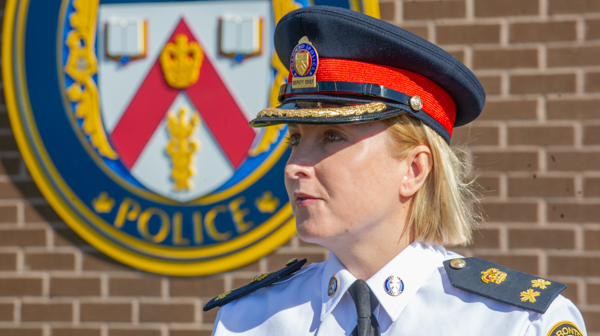

University of Guelph-Humber Justice Studies sessional instructor Dr. Shawna Coxon has been appointed Deputy Commissioner of An Garda Síochána, Ireland’s National Police and Security Service.
With the appointment, Dr. Coxon – who most recently served as Deputy Chief of the Toronto Police Service – assumes the second-highest ranking within Garda, a police service that has roughly 15,000 sworn members and counts nearly 3,000 civilian staff.
Dr. Coxon’s appointment marks the first time in the history of the Garda that both deputy commissioner posts will be filled by women, with Anne Marie McMahon assuming the other post.
Although it wasn’t an easy decision to leave the Toronto Police Service after 25 years with the organization, Dr. Coxon saw a rare opportunity to effect change on a large scale and jumped at the chance.
“This is the largest, most progressive police reform project in the world. As the Deputy Commissioner of Strategy, Governance & Performance, I will be an executive lead on numerous enterprise-wide transformation projects. That excites me,” Dr. Coxon said.
“The Garda is undertaking this modernization using methods that have been very successful in other sectors. The policing world should be watching what they’re doing, because they’re doing it well.”
A lifetime of law enforcement experience
Dr. Coxon began with the Toronto Police Service in 1996, when she worked in downtown Toronto in vice and other units investigating child abuse, youth crime and the sexual assault squad. Over the years, Dr. Coxon climbed the ranks, working in intelligence, human rights, professional standards and community response. She also started the inaugural Computer Cyber Crime (C3) team.
Dr. Coxon has long had an interest in exploring progressive policy. Prior to being named Deputy Chief, she was a member of the Toronto Police Service’s modernization initiative, otherwise known as the Transformational Task Force. She also implemented Canada’s first policing Internal Support Networks and organized the first police-led Racially Biased Policing Conference.
As she built her career in policing, Dr. Coxon simultaneously pursued her passion for academia. With an undergraduate degree already in hand, she continued her post-graduate education while working full-time in law enforcement, ultimately earning a master’s degree in Criminology from the University of Toronto in 2001 and a Ph.D. in Law from Leicester University in 2014.
She’s also spent roughly 15 years teaching at the University of Guelph-Humber, forging a close connection with class after class of Justice Studies graduates.
After a quarter-century of establishing herself in Canada’s largest city, Dr. Coxon had mixed emotions about leaving even for such an important and potentially influential position. Ultimately, however, this was simply an opportunity she couldn’t turn down.
“I have spent the best years of my life with the Toronto Police Service. Everything I have become, everything I have been able to do is because of the Service and I feel immensely grateful,” she said.
“It's the people I'm going to miss. I've worked with so many incredible people; we've shared the best and the worst of times together. It really is like an extended family and I'm sad to leave them. I feel like I'm planning a wedding and a funeral at the same time.”
A new challenge
Dr. Coxon says that the history-making nature of her appointment is meaningful to her, though she points out that An Garda Síochána is already progressive when it comes to gender balance within law enforcement.
“The Garda has approximately 27 per cent women and their upper senior management team is almost at par for men to women,” she points out. “This is above and beyond what most Canadian police services have done and I'm eager to see how they're doing it.”
On a personal level, moving overseas required a real leap of faith on Dr. Coxon’s part.
Although she’s an experienced traveller who has taken almost a dozen community-development volunteering trips to countries including Ghana, Kenya, Thailand, China and Uganda, she has no particular connection to Ireland. In fact, she’s visited only twice, once on a University of Guelph-Humber Study Abroad course looking at the history of policing in the Republic and Northern Ireland.
But Dr. Coxon has never shied away from a challenge, and she seems energized by the ambition of her latest adventure.
“I don’t know a soul in Ireland. I feel like I’m embarking on an adventure to places unknown. It’s uncomfortable and at times it feels scary, but I’ve learned that that’s the place where we learn and grow the most,” she said.
“That’s something people don’t talk about: You need to do the things that scare you. You will be surprised at what life brings you when you do.”







